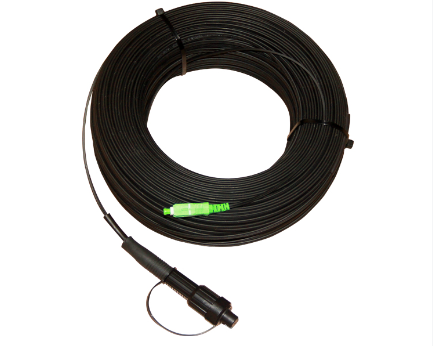2024 Guide to Finding Bend-Insensitive and Durable FTTH Patch Cord

FTTH Patch Cord Overview
Understanding FTTH Patch Cords
FTTH patch cords, also known as fiber optic patch cords, are indispensable for establishing seamless internet connectivity and efficient telecommunication. These cords are designed to connect end-user equipment to the fiber optic network, ensuring reliable data transmission. In the realm of FTTH technology, the features of bend-insensitive and durable patch cords hold significant importance in determining their effectiveness. The 2024 guide delves into the world of FTTH technology, shedding light on the crucial role played by bend-insensitive and durable patch cords in optimizing network performance.
Understanding FTTH Patch Cords
What are FTTH Patch Cords?
FTTH patch cords, also known as fiber optic patch cords, serve a critical role in the last mile of telecommunication networks.
These specialized cables are essential for connecting end-user equipment to the fiber optic network, facilitating seamless data transmission and reliable internet connectivity.
Features of Bend-Insensitive Patch Cords
Bend-insensitive patch cords are meticulously engineered to minimize signal loss and maintain optimal performance even under tight bends or curves.
Designed for flexibility and durability, these patch cords are ideal for installations where the ability to withstand bending is crucial for uninterrupted data transmission.
Ensuring Internet Connectivity
Reliable internet connectivity is the cornerstone of seamless communication and access to a wide array of online resources. Whether it's for work, education, entertainment, or staying connected with loved ones, a stable web connection is essential in today's digital age. FTTH patch cords play a pivotal role in ensuring that end-users experience consistent and high-speed internet connections.
Importance of Reliable Internet Connectivity
Stable and reliable internet connectivity is vital for uninterrupted access to online resources and services.
It enables smooth communication, efficient workflow, and access to educational materials and entertainment.
Impact of Bend-Insensitive Cords on Internet Performance
Bend-insensitive patch cords significantly contribute to maintaining the integrity of the signal, thereby minimizing downtime and ensuring uninterrupted internet connectivity. Their ability to withstand tight spaces and complex routing challenges makes them indispensable in optimizing internet performance.
By incorporating bend-insensitive patch cords into telecommunication networks, the potential disruptions caused by bending or tight installations are mitigated, resulting in enhanced internet reliability.
Selecting the Right Patch Cord
Factors to Consider When Choosing FTTH Patch Cords
When selecting FTTH patch cords, it is crucial to consider the specific requirements of the installation to ensure optimal performance and durability. Here are the key factors to keep in mind:
Bend Radius and Flexibility: Assess the bend radius and flexibility needs of the installation to determine the suitability of the patch cord for navigating tight spaces and corners. A cord with greater flexibility can adapt to challenging routing scenarios, ensuring reliable connectivity.
Durability and Environmental Resistance: Evaluate the durability and environmental resistance of the patch cord materials. Opt for cords constructed with robust materials that can withstand varying environmental conditions, ensuring a long-lasting and reliable connection.
Comparing Bend-Insensitive and Conventional Patch Cords
When comparing bend-insensitive patch cords with conventional ones, it becomes evident that bend-insensitive cords offer superior performance in challenging installation scenarios. Their durable design and robust construction make them ideal for demanding environments where traditional patch cords may fall short. Understanding these differences is essential for making an informed decision when selecting the right patch cord, ensuring a reliable and efficient telecommunication network.
Enhancing Telecommunication Efficiency
Optimizing Telecommunication Networks with Bend-Insensitive Patch Cords
Incorporating bend-insensitive patch cords into telecommunication networks significantly enhances their efficiency and reliability. These specialized cords facilitate seamless data transmission, reducing the risk of signal degradation and ensuring consistent performance. By minimizing signal loss, these patch cords contribute to maintaining the integrity of the communication networks, ultimately optimizing their overall efficiency.
Investing in bend-insensitive patch cords is a strategic move towards future-proofing telecommunication infrastructure. As the demand for high-speed and reliable connectivity continues to grow, these patch cords play a pivotal role in ensuring that telecommunication networks can scale and adapt to meet these increasing demands. Their robust design and ability to withstand bending make them essential components for building a resilient and adaptable telecommunication infrastructure.
Future-Proofing Telecommunication Infrastructure
Embracing bend-insensitive patch cords is crucial for future-proofing telecommunication infrastructure. These advanced cords ensure that communication networks are equipped to handle evolving technological advancements, growing user demands, and emerging challenges. By integrating bend-insensitive patch cords, telecom companies can position their infrastructure to seamlessly adapt to future requirements, thereby staying ahead in the dynamic landscape of telecommunication technology.
Choosing the Ideal FTTH Patch Cord
When selecting the ideal FTTH patch cord, it is essential to prioritize bend-resistance and durability to ensure reliable internet connectivity and efficient telecommunication. By understanding the features and considerations involved in choosing the right patch cord, network performance can be optimized effectively. Whether it's a fiber optic patch cord, a bend-resistant patch cable, or a durable fiber optic jumper, prioritizing these characteristics is crucial for seamless data transmission and long-term reliability.
See Also
Durable Outdoor Connectivity: OptiTap's Waterproof FTTA Patch Cord
Game-Changing Solution: Understanding FTTR Invisible Fiber Cable
FastConnect Fiber Field Assembly Connector: Outdoor Waterproof Benefits
FiberHome Flat Drop Cable: Streamlining Installations
OptiTap MPO Multimode OM3 IP68-rated: Waterproof Fiber Optic Cables Benefits


